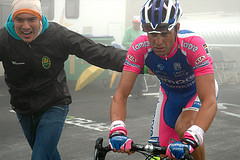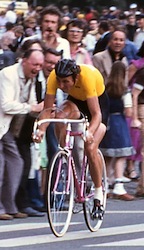 It’s tough to argue that this latest installment of the Grande Boucle wasn’t an entertaining spectacle. The first week alone furnished more action and GC changes than the 2002 version in its entirety, and close races in all the major competitions marked much of the event.
It’s tough to argue that this latest installment of the Grande Boucle wasn’t an entertaining spectacle. The first week alone furnished more action and GC changes than the 2002 version in its entirety, and close races in all the major competitions marked much of the event.
Most of the race—certainly its chaotic opening—still seem compelling; Chatreau and Pineau trading off breakaways and battling for KOMs was good fun while waiting for the GC riders to open hostilities. And seeing the aggression pay off for so many breakaways was a nice change—something many have taken as the sign of a cleaner race, though others are not so convinced.
Cav did make the sprints something of a foregone conclusion toward the end of the race, but his early struggles and the drama surrounding the Renshaw ejection certainly had me looking forward to the final three kilometers on nearly every flat stage. Petacchi might not have been the sentimental favorite for Green—even without the whole perfluorocarbon investigation, Cav was flat out faster, and Thor made a more concerted effort at chasing the points crown—but Ale-Jet brought enough to the competition that I wasn’t sad to see him win it.
Looking back today, though, I’m really wondering at all the excitement I felt for the GC race. Sure, the narrow time margin between Schleck and Contador for much of the race kept the tension high, but really, where were the differences made? A slipped chain? Holding Cancellara’s wheel across a section of pavé? A ham-fisted, bobbling attack on a Third Category climb?
While the time gaps were smaller this time around, what made the 2003 Tour an awesome spectacle was the way the GC favorites seemed to just trade haymakers. On Alpe du Huez, Armstrong claimed yellow, but lost two minutes to Iban Mayo. Vino’s eff-you attack on the descent into Gap the next day lead took Beloki out of the race, and led to the now-famous shortcut. Then there was Jan Ullrich’s leg-shattering TT effort on Stage 12, Armstrong slowly bleeding time over the following days, break pads, Ullrich’s attack over the Tourmalet, Luz-Ardiden, fog, musette bags, the final TT, the rain…
 I’m not saying the 2010 event wasn’t a great race, full of all the right kinds of intrigue and polemics. I’m not even saying that the battle between Schleck and Contador wasn’t a good contest—they worked together to distance their rivals, then took their shots against each other. I don’ think either left anything out on the course—and in the case of Contador, some are still arguing he tried a little bit too hard.
I’m not saying the 2010 event wasn’t a great race, full of all the right kinds of intrigue and polemics. I’m not even saying that the battle between Schleck and Contador wasn’t a good contest—they worked together to distance their rivals, then took their shots against each other. I don’ think either left anything out on the course—and in the case of Contador, some are still arguing he tried a little bit too hard.
But for me, the greatest GC battles are back-and-forth affairs—rivals constantly trying to leverage their strength against their opponents weakness, and struggling to limit their losses when the tide turns the other way. Maybe Schleck’s and Contador’s abilities were just too closely aligned this July, or maybe this is just how most Grand Tours will be contested until the memory of “the refills” has slipped from the peloton’s collective memory.
Hopefully next year, another closely- and cleanly-fought Tour will shed some more light on the subject.
The provisional start-list for San Sebastian has AC and Schleck. I don’t expect much of a showdown there, but would still be fun to see.
Speaking of “refills”, interesting to see which riders were mediocre or claiming illness this year.
My feelings are pretty close to yours here. Great rivalries have that see-saw feel, with the contenders trading blows, one guy looking the strongest one day, the other guy looking the strongest the next. Schleck and Contador, however, seemed unable to take very much time out of one another, and so, as you say, the GC was inordinately affected by a series of unfortunate events — the stage-nullification (which saved Schlecks’ GC chances), Contador’s broken wheel on the pave, and Schleck’s famous dropped chain.
Also, the clash of personalities here leaves something to be desired. As far as I can tell, it comes down to quiet-easygoing-nice-kid vs. quiet-but-nervous-nice kid. There have been attempts to portray Contador as some kind of McEnroeish brat . . . alas! if only that were even remotely the case!
I’m not sure how much of a rivalry you can have with your buddy. If Schleck wants to win, he needs to stop holding hands with AC. I can’t think, off the top of my head, how many buddies there have been in sport. Buddies that want to beat the other buddy.
Come on AC, step on Schelck’s kitten and make him mad!
With the role of the team ever increasing, it’s no wonder that the GC battles are whittled down to just the ITTs, the rare TTT, and very few mountain finishes.
When the directeur sportifs make the call, who can blame them for playing it safe? All GC hopefuls within striking distance of the podium wait for the final 5 km of the very few mountaintop finishes before making a move. Nobody wants to risk attacking early lest they get pulled back by their adversaries’ very organized super-domestiques.
I think there are two paths to change the way the game is (not) played:
1. Limit communication from team cars to riders.
2. Limit the size of the teams.
In this last TdF I paid attention only on the breakaway stages since they are much more interesting. The breakaway specialists ride to WIN the stage. The GC contenders all ride to limit losses, except maybe for A. Schleck after his little incident. Even then, it didn’t look like he took excessive risks. He gave 15 accelerations, but none of them were made until the last climb.
@Julius: I too have wondered what the TDF would look like if you downsized teams to, say, seven riders apiece, and then let more teams in. Besides addressing the perennial problem of the exclusion of good non-ProTour squads like Skil-Shimano and Vacansoleil, it would put more contenders into the mix while reducing the amount of control any one team could exercise. I’m trying to think of the negatives here: too many cars on the road?
There’s no question this year’s Tour de France left a bit to be desired in terms of excitement unrelated to pavement changes and mechanicals – and even in the matter of unpredictable conditions it clearly loses to this year’s epic Giro.
Problem is, thinking of the most exciting races of the past few years in terms of GC contending and mountain stages, except for the 2003 race it’s hard to find a good example. 2006 and 2007 were pretty disputed and fun to watch, but I guess due to circumstances we can’t really compare.
The Tour hasn’t since been as exciting, possibly due to Contador’s (and this year’s also Schleck’s) overt dominance over the rest of the pack, and I’m not sure if unwillingness of just plain incapacity from others to attack. However, it shouldn’t just be a matter of just who is stronger over a predictable course. This is not track racing. It should also be about tactics and dealing with unpredictable situations coming the riders’/teams’ way.
In this sense, the Tour could probably take a page from the Giro and change things up a bit – introduce new variables, alter the course, so that we could have a different race every year. Probably forbidding radios and introducing technical stages are important steps in that direction.